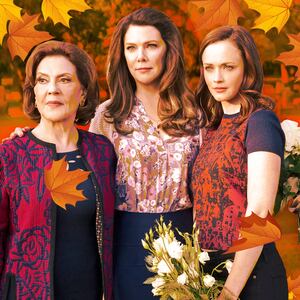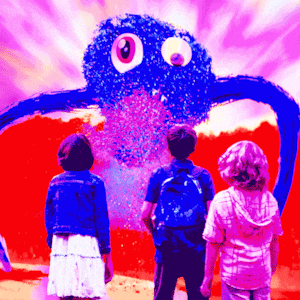Loosely based on a real-life illicit underworld which gripped post-First World War Britain, Dope Girls was always going to draw comparisons with a certain flat-capped period drama. Even its original BBC home appeared to proudly bill it as a “spiritual successor to Peaky Blinders.”
But punkier, dreamier, and queerer than the show which got every middle-aged hipster partying like it’s 1919, the six-parter has more to offer than simply a feminist spin.
Co-written by Polly Stenham, the prodigious playwright whose first West End production premiered when she was just 20, the series—now available on Hulu in the U.S.—sets its subversive tone from the opening flash-forward.
Against the backdrop of a riotous Trafalgar Square and an abrasive, willfully anachronistic electronic score, angel-winged anti-heroine Kate (Julianne Nicholson) emerges from a blood-soaked fountain and unleashes a cathartic scream which emits the show’s title in Heartstopper-style hand scribbles. A warm-fuzzy YA romance, however, this is not.
“In 1914, six million men went to war. In their absence, women took the reins. And they thrived,” notes the accompanying title cards, explaining why not everyone is exactly jumping for joy to hear their other half is now heading back home. “He’s alive,” one crestfallen shopkeeper reads a telegram aloud, quickly establishing the show’s acerbic sense of humor. “I prayed and I prayed. So many dead. Why not him?”

Kate initially seems more accepting of this return to the status quo. But her life is thrown into disarray when her debt-riddled husband hangs himself, leaving her jobless, penniless, and homeless. Absconding to the big smoke with her privately educated teenage daughter Evie (Eilidh Fisher) in tow, she arrives in Soho a desperate figure. Yet thanks to some reluctant assistance from her estranged eldest Billie (Umi Myers), a troubled hedonist with an invaluable knowledge of the capital’s party scene, she soon evolves into a no-nonsense nightclub owner with a rap sheet ranging from urinating on cops to stabbing nepo babies with a personalized hairpin.
In the midst of a banner year thanks to scene-stealing turns in Hacks and Paradise, Nicholson helps sell this unlikely transformation from butcher’s assistant to literal butcheress, imbuing Kate with instincts both maternal and killer and a steely determination to foster some early 20th century girl power. (“I’m not interested in running a club where people turn up, stick their hands up our skirts, and screw us over” she reasons about The 33’s strict door policy).
Sure, her Irish accent may wander more than the cast of Wild Mountain Thyme’s, yet she can still serve up lines like “Cause you don’t fool me, you pencil-d--ked little f---” with impressive gusto.
It’s not just Kate who the opener’s title—“When She Was Bad, She Was Very Very Bad”—can be applied to, though.
Recruited via a patronizing new “Female Experiment” designed to clear the streets of vice (“we cannot allow emotions to interfere with police work,” comes one of the interviewer’s warnings), Eliza Scanlen’s Violet may be on the other side of the law. She’s also not averse to scheming her way to the top via any means necessary, though, whether that’s betraying the club hostesses who welcomed her into their pack, or, most wickedly, framing her girlfriend for sexual assault.
In a genre where men are lauded for breaking bad, it’s refreshing to see deeply flawed, and at times downright despicable, female characters afforded the same trajectory without offering anything approaching an apology.
Of course, the men are just as heinous, the majority stemming from local crime dynasty the Saluccis.
In the series’ most squeamish moment, heir apparent Damaso (Dustin Demri-Burns) silences a disrespectful underling by cutting out his tongue. Younger brother Luca (Rory Fleck Byrne), the golden child war hero whose crippling PTSD manifests itself in increasingly unhinged ways, and son Silvio (Sebastian Croft), a weasely club manager whose downfall sets the narrative wheels in motion, also up the villain quota. While Frank (Ian Bonar), the sadistic sergeant under the thumb of said family, may well be the most repulsive of the lot.
However, Dope Girls understands its girls are the most compelling figures. Even the Saluccis are overseen by a formidable matriarch, with Geraldine James’ deliciously menacing performance far removed from her regal portrayal in its costume drama antithesis Downton Abbey.

Indeed, the show suffers whenever the testosterone levels outweigh the estrogen. Only Eddie (Michael Duke), a flamboyant cabaret performer who’d have smashed a Roaring Twenties equivalent of Drag Race, exudes the same magnetism as the women he sashays around.
Inevitably, purists will scoff at the factual inaccuracies, contemporary turns of phrase, and colorful fashions that looked ripped from the pages of a Vivienne Westwood catalog (“if it looks great, we’re doing it,” director Shannon Murphy acknowledged about the show’s striking aesthetic). Likewise, the constant visual trickery, whether psychedelic drug trips, fantasy sequences, or the running on-screen counter which essentially gamifies all the crimes and misdemeanors.
Occasionally, Dope Girls does succumb to style over substance, as if it doesn’t quite have the confidence to let its big, bold narrative to unfold without any bells and whistles.
This can become a little overstuffed, too, the subplots involving seances, land disputes, and the Spanish Flu epidemic failing to make themselves heard above all the disobedience and debauchery.
Moreover, Kate’s relationship with Billie feels like it should have formed the show’s emotional crux, but only a last-minute tete-a-tete really hits home. Had the show been afforded the luxury of a guaranteed renewal, then it may have given its gallery of rogues just a little more time to breathe.
Sadly, all the Peaky Blinders talk failed to convince audiences waiting for its big-screen transfer to tune in: following underwhelming ratings—perhaps impacted by a late Saturday night slot rather than the usual prime-time Sunday evening tradition and the unfortunate timing of Disney+’s similarly-themed A Thousand Blows—the BBC recently confirmed Dope Girls would be a one-season wonder.
Luckily, unlike every other streaming show with a misplaced faith in executive decisions, it had the sense to wrap up everything with a neat, whiskey-soaked bow while also still leaving the door ajar for another round of empowering chaos. The fact that Kate Meyrick, the very real figure depicted in Marek Kohn’s 1992 source material The Birth of the British Drug Underground, spent an eventful 13 years presiding over her “den of inequity” proves there was plenty of scope for further anarchy, too.
“Life should be filled with joy and laughter,” Kate opines in what proves to be the show’s epitaph. “Isn’t that the point? You see, I believe pleasure is like water. We need it to survive.” Anyone who enjoyed Harlots, The Great, or any other historical drama which gleefully liberated itself from the patriarchal norm should find plenty to soak up here.









